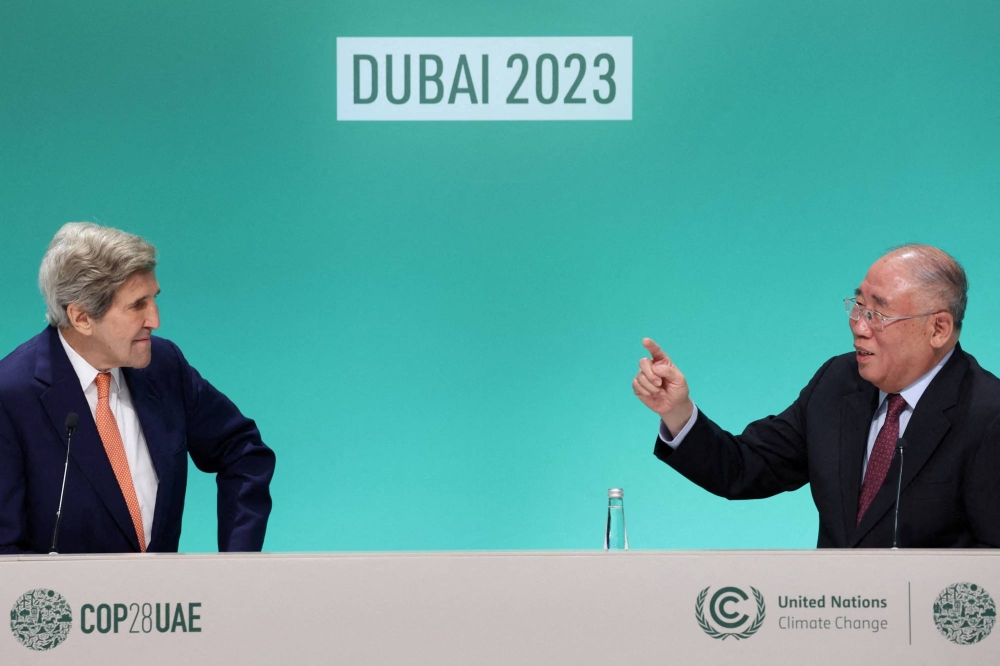The world’s two biggest greenhouse gas emitters are charting a new course for cooperation after the departures of John Kerry and Xie Zhenhua — two titans of climate diplomacy who paved the way for landmark agreements.
Representing the U.S. and China, the two men spent years on opposite sides of the negotiating table hammering out global deals to cut planet-warming emissions. Their close personal relationship has endured even as ties between the two superpowers deteriorated over issues from trade to Taiwan, which is set to become a renewed source of tension after a weekend election that returned the U.S.-friendly ruling party to power.
The challenge now is building a system that can continue even without Xie and Kerry’s unique connection. Their successors will be able to draw on a foundation of goodwill built during their years of leadership and already have a mechanism in place to keep talks going. While China has named career diplomat Liu Zhenmin, 68, to the role, a replacement for Kerry has yet to be announced.
The two countries in 2021 agreed to establish a working group and later tasked it with collaborating on the energy transition, methane, deforestation and the circular economy, among other issues. That group, which had a virtual meeting on Friday, is meant to sustain progress during the shift in envoys and potentially a change in U.S. presidents, too.
“Xie and Kerry knew they were on their way out and they wanted to make sure there was some architecture” so work could carry on, said Jake Schmidt, senior strategic director of international climate at the Natural Resources Defense Council. “Having it embedded in the working group is one way to do that.”
Kerry, a seasoned politician and diplomat, brought unusual gravitas to his role. Previously, the job has been held by bureaucrats who are steeped in diplomacy but lack the same high profile. Biden could go back to that low-key route, though that might require U.S. Secretary of State Antony Blinken to work more aggressively and visibly on climate issues — a challenge given ongoing turmoil in the Middle East and Ukraine.
High-profile potential successors include former Washington state Gov. Jay Inslee, whose 2020 campaign for the White House was focused on climate, and John Podesta, a seasoned government strategist now in the White House overseeing the implementation of the 2022 climate law known as the Inflation Reduction Act.
This year will be challenging for whoever fills the role. This 2024 United Nations COP talks, the most important annual gathering on the climate diplomacy calendar, will focus on how much developed countries must contribute financially to help poor nations deal with global warming. The U.S., which is most responsible for the emissions in the atmosphere today, will be under special scrutiny. China, now the world’s top emitter, is also under pressure to contribute funds, despite its official status as a developing nation.
The summit in Azerbaijan is set to begin just days after a U.S. presidential election that could dramatically reorient the country’s posture on climate. On the campaign trail Republicans and Democrats are already pushing a tougher line against China. Biden will be increasingly under pressure to do the same, making it tough to remain conciliatory over climate issues.
China, meanwhile, has gone with a non-controversial option in Liu, the top diplomat appointed to succeed Xie. A fluent English speaker and law-school graduate, Liu has served as Chinese vice minister for foreign affairs and under-secretary-general for economic and social affairs at the U.N.. He has been involved in past U.N. climate talks, including the Kyoto Protocol and Paris Agreement negotiations.
Liu attended the COP28 summit last year as a senior adviser to Xie and spoke on behalf of the Chinese delegation on several occasions. However, he kept a low profile and avoided conversations with journalists off stage. Many Chinese government officials close to Xie said they want to preserve his legacy in a more visible way to ensure that the levers for cooperation he developed with Kerry continue to work.
Xie and Kerry were key figures at COP28 in Dubai, helping to broker the first global agreement to move away from fossil fuels. As the conference wrapped up, Kerry invited Xie to join him for a closing press conference. The Chinese diplomat stressed that the two men would continue to work together even outside their official roles.
“We are good friends,” Xie said. “Why? Because we have a common philosophy, which is to value and commit to environmental protection and respond to climate change. We will not leave this field and will do our best to push forward the progress.”

